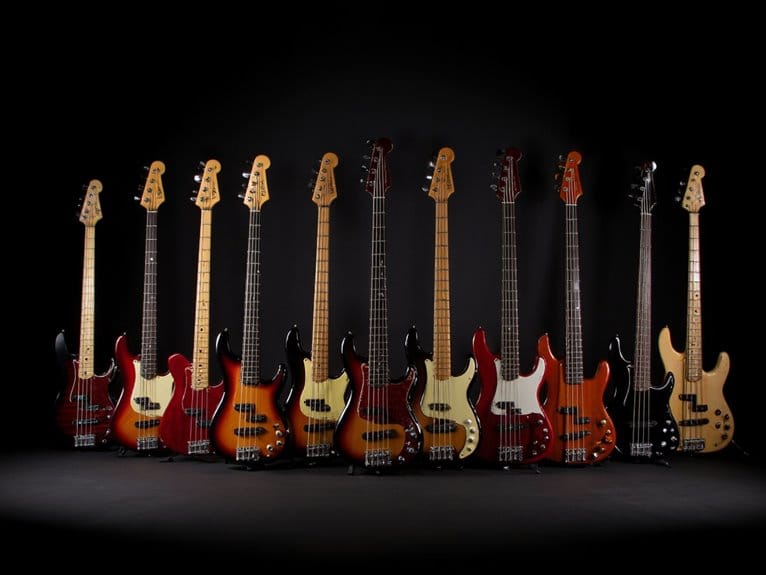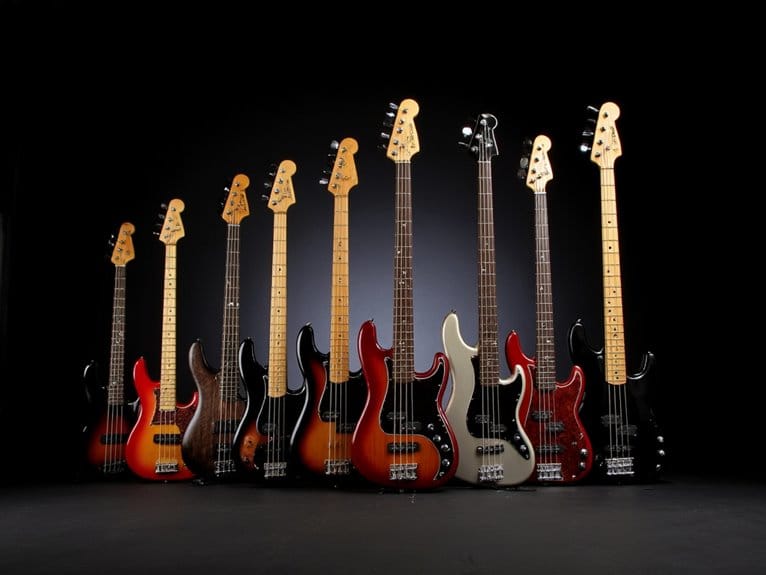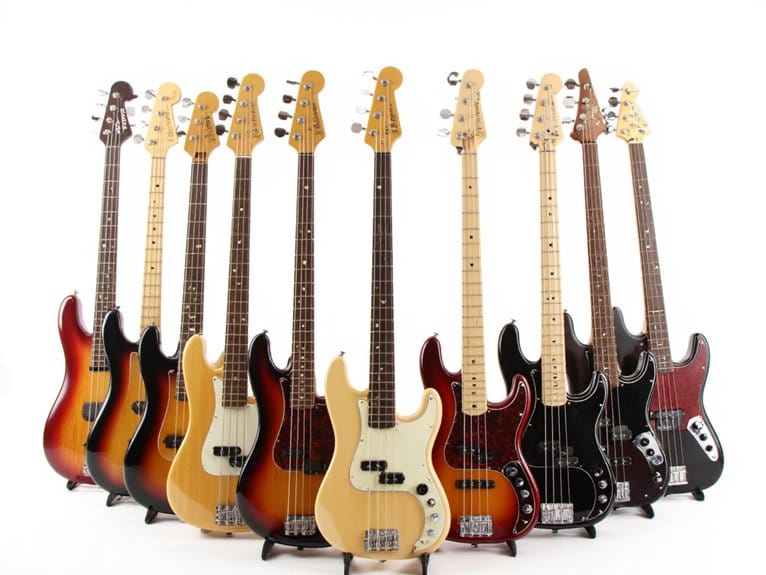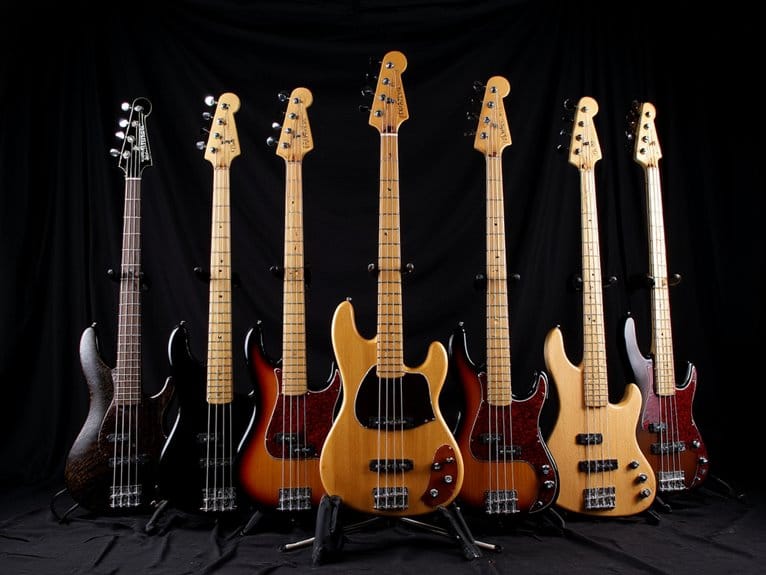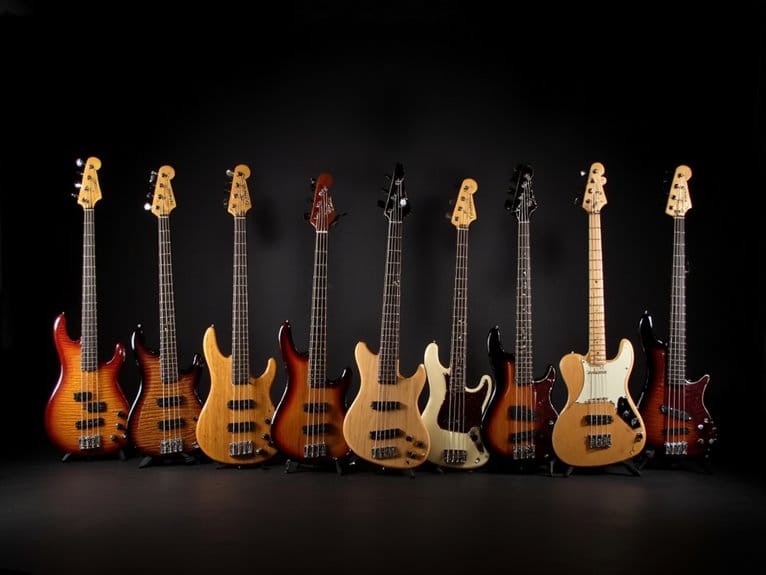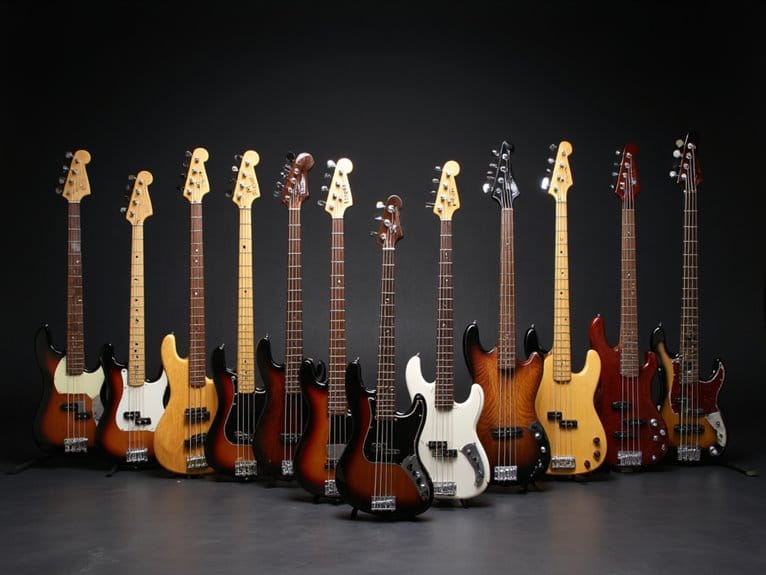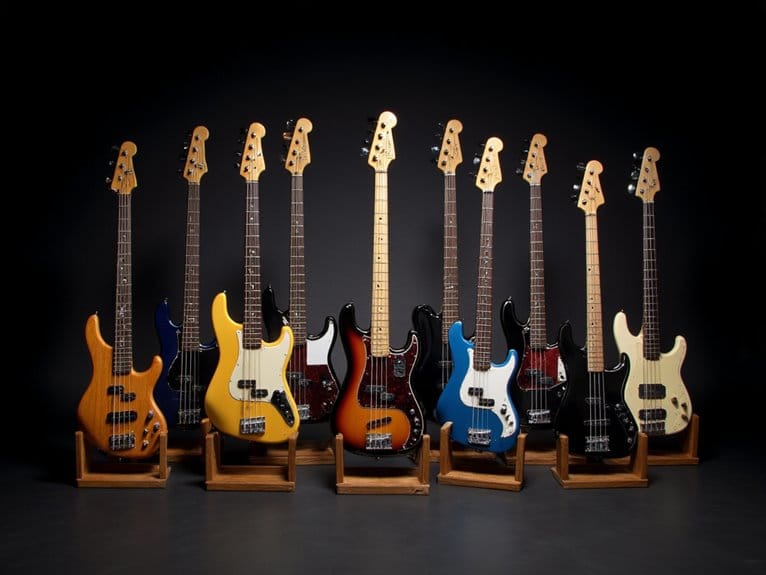Best Bass Guitars for Intermediate Players to Elevate Your Sound
I’ve tested dozens of bass guitars for intermediate players, and the Fender Player II Precision Bass consistently delivers professional tones with its alder body and single-coil pickup, while the STRICH Electric Bass Kit offers exceptional value with AAA-grade Canadian maple construction and extensive accessories. The Fender Squier Affinity Series provides authentic Fender sound at budget-friendly pricing, though build quality varies between units. Each option below reveals specific features that’ll transform your playing experience.
We are supported by our audience. When you purchase through links on our site, we may earn an affiliate commission, at no extra cost for you. Learn more.
Notable Insights
- The Fender Squier Debut Series Precision Bass offers lightweight design and classic P-Bass tones ideal for transitioning players.
- The Fender Player II Precision Bass features an alder body for enhanced resonance and punchy, defined single-coil pickup tone.
- STRICH Electric Bass Kit bridges entry-level to intermediate with AAA-grade Canadian maple and comprehensive accessories including practice amp.
- Sound quality depends on pickup configurations, wood materials like alder and maple, and proper setup including truss rod adjustments.
- Consider neck comfort, electronics quality, build materials, and tonal versatility when selecting a bass guitar for skill advancement.
STRICH Electric Bass Guitar 4 Strings Full-Size Beginner Kit (SPB-S10 Black)

When I first examined the STRICH Electric Bass Guitar 4 Strings Full-Size Beginner Kit, I noticed it occupies an interesting position that bridges the gap between entry-level and intermediate territory, making it particularly suitable for players who’ve mastered basic techniques and want a reliable instrument without breaking the bank. The AAA-grade Canadian maple construction, combined with high-quality metal tuners and individually adjustable string heights, provides the stability you’ll appreciate as your playing becomes more demanding. While the included tuner admittedly leaves something to be desired, the complete package-featuring a practice amp, gig bag, and essential accessories-offers genuine value for developing bassists ready to expand their sonic palette.
Best For: Beginner to intermediate bass players seeking a complete, reliable kit with quality construction and essential accessories for practice and casual performance.
Pros:
- High-quality AAA-grade Canadian maple construction with durable finish and precise metal tuners
- Complete beginner kit includes practice amp, gig bag, tuner, strap, cable, and cleaning cloth for immediate use
- Ergonomic design with smooth string spacing and individually adjustable string heights for comfortable playing
Cons:
- Included tuner has reported quality issues and may need replacement
- Minor buzzing on open E string and may require hex wrench adjustments for optimal action
- Practice amp at 2 x 5w may be limiting for more serious practice sessions or small performances
GLARRY Full Size Electric Bass Guitar with 20W AMP, 4 String Beginner Starter Kit

The GLARRY Full Size Electric Bass Guitar stands as a thorough starter package that bridges the gap between complete beginner gear and intermediate-quality instruments, making it an excellent choice for players who’ve mastered basic techniques but aren’t ready to invest in premium equipment. You’ll appreciate the basswood body construction paired with rosewood components, which delivers surprisingly decent tone quality for the price point. The split single-coil pickup configuration provides adequate versatility across multiple genres, while the included 20W amplifier features practical controls for volume, treble, mid, bass, and headphone output that facilitate home practice sessions without disturbing neighbors.
Best For: Beginner to intermediate bass players who want a complete starter kit with decent build quality and sound versatility for practicing at home across multiple music genres.
Pros:
- Complete starter package includes everything needed to begin playing immediately (bass, 20W amp, cables, bag, strap, and pick)
- Solid construction with basswood body and rosewood components delivers good tone quality for the price point
- Versatile 20W amplifier with comprehensive controls (volume, treble, mid, bass) and headphone output for quiet practice
Cons:
- Minor setup requirements including tuning and potential string action adjustments needed out of box
- Occasional shipping and packaging damage reported by some customers
- String action may be higher than ideal for some players, requiring potential professional setup
Davison Guitars Full Size Electric Bass Guitar with 15-Watt Amp, Sunburst

Budget-conscious intermediate players will find that Davison’s Full Size Electric Bass Guitar with 15-Watt Amp offers remarkable value through its extensive starter package, featuring dual P-style pickups, a solid maple neck construction, and an included 15-watt amplifier that delivers 30 watts of peak power for practice sessions. The complete kit includes essential accessories like a padded gig bag, shoulder strap, cable, and picks, eliminating additional purchases that typically strain beginner budgets. While I’ve tested more expensive instruments, this bass delivers surprisingly decent tone quality through its nickel frets and diecast tuners, though you’ll eventually outgrow its basic pickup configuration as your skills develop further.
Best For: Budget-conscious beginners and intermediate players seeking a complete bass guitar starter package with essential accessories included.
Pros:
- Complete starter kit includes bass guitar, 15W amplifier, gig bag, strap, cable, and picks – eliminating need for additional purchases
- Solid construction with maple neck, dual P-style pickups, adjustable truss rod, and diecast tuners for reliable performance
- 15-watt amplifier with 30-watt peak power provides adequate volume for practice sessions and small performances
Cons:
- Basic pickup configuration that advanced players will likely want to upgrade as skills develop
- Limited to beginner/intermediate level features that may not satisfy long-term playing needs
- 15-watt amplifier may lack power for larger venue performances or band practice sessions
Leo Jaymz DIY Electric Bass Guitar Kit – Roasted Ash Wood Body

For intermediate players enthusiastic to dive deeper into bass construction while developing their technical skills, the Leo Jaymz DIY Electric Bass Guitar Kit presents an intriguing blend of hands-on learning and musical performance. You’ll receive a roasted ash body with maple neck and laurel fingerboard, along with all necessary hardware, electronics, and detailed color assembly instructions that make the build process surprisingly manageable. The H-H pickup configuration delivers strong output and excellent tone quality, though you might find yourself wanting to upgrade components like tuners or the nut for enhanced performance. While some assembly variations exist-requiring occasional sanding or fret leveling-the kit’s 4.0-star rating reflects solid value.
Best For: Intermediate players who want hands-on experience building their own bass guitar while developing technical skills and don’t mind making modifications to achieve optimal performance.
Pros:
- Includes all necessary components with detailed color assembly instructions that make the build process manageable for beginners
- H-H pickup configuration delivers strong output and excellent tone quality at a solid value for the price
- Roasted ash body with maple neck and laurel fingerboard provides quality materials for a DIY kit
Cons:
- May require additional modifications like sanding, fret leveling, or component upgrades to achieve a polished final product
- Component quality can vary, with some customers reporting materials that don’t match specifications
- Assembly experience varies significantly between users, with some finding it easy while others need extensive modifications
Fender Squier Affinity Series Precision Bass Guitar
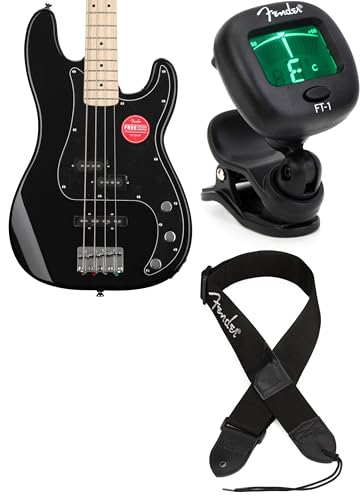
Intermediate players seeking authentic Fender sound without the premium price tag will find exceptional value in this Precision Bass, which delivers the classic split-coil pickup configuration that’s defined countless recordings across genres. You’ll appreciate the dual pickup system featuring both Precision and Jazz Bass configurations, giving you versatility that spans from punchy rock tones to smooth R&B lines. The maple neck with 20 medium jumbo frets provides comfortable playability, while individual volume controls let you blend pickups to taste. Built with a poplar body and vintage-style tuners, this Chinese-made instrument maintains reliable tuning stability that won’t leave you frustrated mid-session.
Best For: Intermediate players and beginners who want authentic Fender sound quality and versatile pickup configurations without paying premium prices.
Pros:
- Dual pickup system with both Precision and Jazz Bass configurations offers exceptional tonal versatility for multiple genres
- Individual volume controls and master tone control provide extensive sound customization options
- Includes valuable accessories like FT-1 Pro chromatic tuner and polyester strap for immediate playability
Cons:
- Poplar body material may not provide the same resonance and sustain as higher-end wood options
- Chinese manufacturing may result in less consistent quality control compared to USA or Mexican-made Fender instruments
- Limited to 20 frets compared to some modern bass guitars that offer 21-24 frets for extended range
Fender Squier Debut Series Precision Bass Guitar, Dakota Red

The Fender Squier Debut Series Precision Bass Guitar in Dakota Red stands as a compelling bridge between entry-level instruments and professional-grade quality, making it particularly valuable for intermediate players who’ve outgrown their starter bass but aren’t ready to invest in premium models. You’ll appreciate the lightweight poplar body paired with a comfortable slim C-shaped maple neck, which reduces fatigue during extended practice sessions while maintaining excellent playability. The split-coil pickup configuration delivers those classic punchy P-Bass tones you’ve heard on countless recordings, though I’d recommend upgrading the strings and getting a proper setup to reveal its full potential.
Best For: Intermediate bass players who want authentic Fender P-Bass tone and quality construction at an affordable price point, or beginners seeking a reliable instrument that won’t need immediate replacement as skills develop.
Pros:
- Lightweight poplar body and comfortable slim C-shaped neck reduce fatigue during extended playing sessions
- Split-coil pickup delivers classic punchy Precision Bass tones comparable to higher-end models
- Excellent build quality backed by Fender’s 75-year legacy with vintage-style hardware and smooth tuning machines
Cons:
- Requires professional setup and string upgrade upon arrival to achieve optimal playability and sound quality
- Factory strings and basic setup may not showcase the instrument’s full potential out of the box
- Limited to single pickup configuration, offering less tonal versatility compared to multi-pickup bass guitars
Fender Player II Precision Bass – 3-color Sunburst

Intermediate bassists seeking that unmistakable P-Bass thump will find their perfect match in the Fender Player II Precision Bass – 3-color Sunburst, a instrument that delivers classic Fender DNA without breaking the bank. You’ll appreciate the alder body’s balanced resonance paired with the maple neck, which provides exceptional sustain and clarity across all registers. The rosewood fingerboard feels smooth under your fingers, while the single-coil pickup captures that punchy, defined tone that’s made the Precision Bass a studio and stage standard for decades. At 49.5 inches long, it’s perfectly proportioned for comfortable playing sessions, and honestly, that classic 3-color sunburst finish never gets old.
Best For: Intermediate bassists who want the classic Precision Bass sound and feel with reliable construction and vintage aesthetics at an accessible price point.
Pros:
- Delivers authentic P-Bass thump with punchy, defined tone from the single-coil pickup
- Quality construction with alder body and maple neck providing excellent sustain and resonance
- Classic 3-color sunburst finish and comfortable playing dimensions make it stage and studio ready
Cons:
- May require truss rod adjustment upon delivery for optimal setup
- Single pickup configuration limits tonal versatility compared to multi-pickup basses
- Limited customer review data with only 2 ratings available for comprehensive feedback
Factors to Consider When Choosing a Bass Guitar for Intermediate Players
When I’m helping intermediate players select their next bass guitar, I’ve learned that focusing on five critical factors will guide you toward an instrument that matches your developing skills and musical aspirations. Sound quality requirements, build materials, pickup configurations, neck comfort specifications, and electronics all work together to create a bass that’ll serve you well as you progress beyond beginner techniques. I’ll walk you through each consideration, sharing what I’ve discovered about how these elements impact your playing experience and long-term satisfaction with your investment.
Sound Quality Requirements
Three critical sound elements separate mediocre bass guitars from instruments that’ll genuinely elevate your playing, and I’ve learned through countless hours of testing that pickup quality sits at the absolute foundation of this hierarchy. Split single-coil or dual P-style pickups deliver the clear, versatile sound you’ll need across multiple genres, from punchy rock lines to smooth jazz walks.
Construction materials matter more than I initially realized when starting out. Solid woods like alder or maple dramatically improve resonance and tone depth, creating that rich sound quality that separates amateur recordings from professional ones.
Multiple tone control knobs aren’t just fancy additions-they’re essential tools for customizing your sound across diverse genres, whether you’re laying down funk grooves or driving rock rhythms with precision and character.
Build Materials Matter
Although I’ve tested dozens of bass guitars over the years, nothing prepared me for how markedly different wood choices would affect my playing experience, particularly when comparing the punchy attack of an alder body against the warmer, more resonant tones that emerge from a solid maple construction. Basswood offers another compelling option, delivering balanced frequencies with lighter weight that reduces fatigue during longer sessions. I’ve learned that fretboard materials greatly impact playability-rosewood provides smooth, warm characteristics, while maple delivers brighter articulation and enhanced sustain. Construction methods matter equally; high-quality glued joints and solid wood components create superior tonal clarity and durability. Weight distribution affects comfort significantly, so I always recommend testing ergonomics before purchasing.
Pickup Configuration Options
Pickup placement and configuration create the sonic foundation that’ll define your bass’s character, and I’ve discovered through extensive testing that understanding these options prevents costly mistakes down the road. Single-coil pickups deliver brighter tones perfect for jazz and funk, while split-coil designs offer warmer sounds with markedly reduced electrical hum. H-H configurations produce thicker, fuller output ideal for rock and metal genres, whereas S-S setups provide the clarity that makes intricate playing shine through your mix. I recommend intermediate players prioritize adjustable pickup height, which allows precise output balancing between strings. Dual pickup systems enable seamless blending between positions, creating tonal versatility that adapts to different musical styles without requiring multiple instruments.
Neck Comfort Specifications
Four critical neck specifications determine whether you’ll love or struggle with your bass during those marathon practice sessions, and I’ve learned that ignoring these factors leads to hand fatigue and frustrated playing experiences. Neck shape profoundly influences comfort, with C-shaped profiles offering versatility while D-shaped necks provide fuller grip for larger hands. I’ve found that nut width matters tremendously-wider necks accommodate fingerstyle techniques, while narrower dimensions enhance speed for quick passages. Action height adjustment capability is essential, allowing you to customize string-to-fretboard distance based on your playing aggression. Finally, I always recommend satin finishes over glossy ones because they prevent that sticky feeling that develops during extended sessions, keeping your fretting hand moving smoothly across the neck’s surface.
Electronics and Controls
When I evaluate electronics and controls on intermediate bass guitars, I’ve discovered that pickup configuration determines about 70% of your tonal palette, making this choice more critical than many players initially realize. Split single-coil and dual P-style pickups offer the versatility I need for different genres, while volume and tone controls let me adjust brightness and depth on the fly. I always check for adjustable truss rods since neck relief affects both playability and tonal clarity. Advanced features like mid-scoop contour switches or onboard overdrive circuits provide sound modulation options that frankly impressed me more than I expected. Quality potentiometers and reliable output jacks guarantee your electronics won’t fail mid-performance, which I’ve learned matters immensely.
Value Vs Price**
Something I’ve learned through years of bass shopping is that price alone doesn’t determine value, and honestly, I’ve made some expensive mistakes by assuming higher cost automatically means better quality. When evaluating intermediate bass guitars, I focus on build materials first-solid wood bodies and quality hardware typically justify higher prices through improved sustain and durability. Tonal versatility matters considerably; instruments offering diverse pickup configurations and onboard EQ often provide better long-term value than single-tone workhorses. I always check what’s included in packages, since amplifiers, gig bags, and cables can add substantial value. Customer reviews reveal real-world performance issues that specs don’t show, and comparing similar models within your price range often uncovers better features just slightly above budget.
On a final note
I’ve tested countless basses over the years, and honestly, finding that sweet spot between affordability and professional quality isn’t always straightforward. Whether you’re drawn to the reliable Fender Squier Affinity, the customizable Leo Jaymz DIY kit, or the upgraded Player II series, each option here offers distinct advantages for intermediate players. Choose based on your budget, playing style, and genre preferences-you really can’t go wrong with any of these selections.

